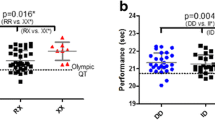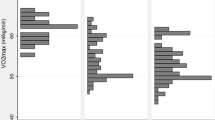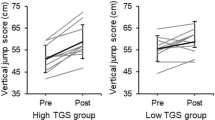Abstract
Purpose
The aim of this study is to investigate the influence of the MCT1 T1470A polymorphism (rs1049434) on repeated sprint ability (RSA) and lactate accumulation after RSA testing.
Methods
Twenty-six elite Italian male football players (age: 17.7 ± 0.78 years; height: 179.2 ± 7.40 cm; weight: 72.1 ± 5.38 kg) performed RSA testing (6 × 30-m sprints with an active recovery between sprints), and lactate measurements were obtained at 1, 3, 5, 7, and 10 min post-exercise. Genotyping for the MCT1 T1470A polymorphism was performed using PCR.
Results
Genotype distributions were in Hardy–Weinberg equilibrium, being 42% wildtype (A/A), 46% heterozygotes (T/A), and 12% mutated homozygotes (T/T). Significant differences between genotypic groups were found in the two final sprint times of the RSA test. Under a dominant model, carriers of the major A-allele (Glu-490) in the dominant model showed a significantly lower sprint time compared to footballers with the T/T (Asp/Asp) genotype (5th Sprint time: A/A + T/A = 4.60 s vs TT = 4.97 s, 95% CI 0.07–0.67, p = 0.022; 6th Sprint: A/A + T/A = 4.56 s vs T/T = 4.87 s, 95% CI 0.05–0.57, p = 0.033).
Conclusions
The T1470A (Glu490Asp) polymorphism of MCT1 was associated with RSA. Our findings suggest that the presence of the major A-allele (Glu-490) is favourable for RSA in football players.




Similar content being viewed by others

Abbreviations
- AIC:
-
Akaike Information Criterion
- ATP:
-
Adenosine triphosphate
- BIC:
-
Bayesian information criterion
- BLc:
-
Blood Lactate concentration
- BLc-max:
-
Maximal blood lactate concentration
- DNA:
-
Deoxyribonucleic acid
- H + :
-
Hydrogen ion
- MCT:
-
Monocarboxylate transporter
- MCT1 :
-
Monocarboxylate Transporter-1 T1470A polymorphism
- PCr:
-
Phosphocreatine
- PCR:
-
Polymerase chain reaction
- RSA:
-
Repeated sprint ability
- Sdec:
-
Sprint decrement
- SNP:
-
Single-nucleotide polymorphism
- S:
-
Sprint
- VO2max :
-
Maximal oxygen uptake
References
Aziz AR, Chia M, Teh KC (2000) The relationship between maximal oxygen uptake and repeated sprint performance indices in field hockey and soccer players. J Sports Med Phys Fit 40:195–200 (PMID: 11125761)
Aziz AR, Mukherjee S, Chia MY, Teh KC (2007) Relationship between measured maximal oxygen uptake and aerobic endurance performance with running repeated sprint ability in young elite soccer players. J Sports Med Phys Fit 47:401–407 (PMID: 18091678)
Aziz AR, Mukherjee S, Chia MY, Teh KC (2008) Validity of the running repeated sprint ability test among playing positions and level of competitiveness in trained soccer players. Int J Sports Med 29:833–838. https://doi.org/10.1055/s-2008-1038410
Balsom P, Seger J, Sjödin B, Ekblom B (1992) Maximal-intensity intermittent exercise: effect of recovery duration. Int J Sports Med 13:528–533. https://doi.org/10.1055/s-2007-1021311
Bangsbo J (2014) Physiological demands of football. Sports Sci Exch 27:1–6
Bishop D, Edge J (2006) Determinants of repeated-sprint ability in females matched for single-sprint performance. Eur J Appl Physiol 97:373–379. https://doi.org/10.1007/s00421-006-0182-0
Bishop D, Lawrence S, Spencer M (2003) Predictors of repeated sprint ability in elite female hockey players. J Sci Med Sport 6:199–209. https://doi.org/10.1016/s1440-2440(03)80255-4
Bishop D, Edge J, Davis C, Goodman C (2004a) Induced metabolic alkalosis affects muscle metabolism and repeated-sprint ability. Med Sci Sports Exerc 36:807–813. https://doi.org/10.1249/01.mss.0000126392.20025.17
Bishop D, Edge J, Goodman C (2004b) Muscle buffer capacity and aerobic fitness are associated with repeated-sprint ability in women. Eur J Appl Physiol 92:540–547. https://doi.org/10.1007/s00421-004-1150-1
Bishop D, Girard O, Mendez-Villanueva A (2011) Repeated-sprint ability—part II: recommendations for training. Sports Med 41:741–756. https://doi.org/10.2165/11590560-000000000-00000
Bogdanis GC, Nevill ME, Boobis LH, Lakomy HK (1996) Contribution of phosphocreatine and aerobic metabolism to energy supply during repeated sprint exercise. J Appl Physiol 80:876–884. https://doi.org/10.1152/jappl.1996.80.3.876
Bonen A (2001) The expression of lactate transporters (MCT1 and MCT4) in heart and muscle. Eur J Appl Physiol 86:6–11. https://doi.org/10.1007/s004210100516
Bonen A, Miskovic D, Tonouchi M, Lemieux K, Wilson MC, Marette A, Halestrap AP (2000a) Abundance and subcellular distribution of MCT1 and MCT4 in heart and fast-twitch skeletal muscles. Am J Physiol Endocrinol Metab 278:E1067–E1077. https://doi.org/10.1152/ajpendo.2000.278.6.E1067
Bonen A, Tonouchi M, Miskovic D, Heddle C, Heikkila JJ, Halestrap AP (2000b) Isoform-specific regulation of the lactate transporters MCT1 and MCT4 by contractile activity. Am J Physiol Endocrinol Metab 279:E1131–E1138. https://doi.org/10.1152/ajpendo.2000.279.5.E1131
Chen YJ, Wong SH, Wong CK, Lam C, Huang Y, Siu PM (2008) Effect of pre-exercise meals with different glycemic indices and loads on metabolic responses and endurance running. Int J Sport Nutr Exerc Metab 18:281–300. https://doi.org/10.1123/ijsnem.18.3.281
Cupeiro R, Benito PJ, Maffulli N, Calderón FJ, González-Lamuño D (2010) MCT1 genetic polymorphism influence in high intensity circuit training: a pilot study. J Sci Med Sport 13:526–530. https://doi.org/10.1016/j.jsams.2009.07.004
Cupeiro R, González-Lamuño D, Amigo T, Peinado AB, Ruiz JR, Ortega FB, Benito PJ (2012) Influence of the MCT1-T1470A polymorphism (rs1049434) on blood lactate accumulation during different circuit weight trainings in men and women. J Sci Med Sport 15:541–547. https://doi.org/10.1016/j.jsams.2012.03.009
Cupeiro R, Pérez-Prieto R, Amigo T, Gortázar P, Redondo C, González Lamuño D (2016) Role of the monocarboxylate transporter MCT1 in the uptake of lactate during active recovery. Eur J Sport Sci 116:1005–1010. https://doi.org/10.1007/s00421-016-3365-3
da Silva JF, Guglielmo LGA, Bishop DJ (2010) Relationship between different measures of aerobic fitness and repeated-sprint ability in elite soccer players. Strength Cond Res 24:2115–2121. https://doi.org/10.1519/JSC.0b013e3181e34794
Di Salvo V, Baron R, González-Haro C, Gormasz C, Pigozzi F, Bachl N (2010) Sprinting analysis of elite soccer players during European Champions League and UEFA Cup matches. J Sports Sci 28:1489–1494. https://doi.org/10.1080/02640414.2010.521166
Donaldson SKB, Hermansen L, Bolles L (1978) Differential, direct effects of H+ on Ca2+-activated force of skinned filügers from the soleus, cardiac and adductor magnus muscles of rabbits. Pflugers Arch 376:55–65. https://doi.org/10.1007/BF00585248
Dubouchaud H, Butterfield GE, Wolfel EE, Bergman BC, Brooks GA (2000) Endurance training, expression, and physiology of LDH, MCT1, and MCT4 in human skeletal muscle. Am J Physiol Endocrinol Metab 278:E571–E579. https://doi.org/10.1152/ajpendo.2000.278.4.E571
Fedotovskaya ON, Mustafina LJ, Popov DV, Vinogradova OL, Ahmetov II (2014) A common polymorphism of the MCT1 gene and athletic performance. Int J Sports Physiol Perform 9:173–180. https://doi.org/10.1123/ijspp.2013-0026
Fishbein WN (1986) Lactate transporter defect: a new disease of muscle. Science 234(4781):1254–1256. https://doi.org/10.1126/science.3775384
Fitzsimons M, Dawson B, Ward D, Wilkinson A (1993) Cycling and running tests of repeated sprint ability. Aust J Sci Med Sport 25:82–82
Fredholm B, Hjemdahl P (1976) Inhibition by acidosis of adenosine 3’-5’-cyclic monophosphate accumulation and lypolysis in isolated rat fat cell. Acta Physiol Scand 96:160–169. https://doi.org/10.1111/j.1748-1716.1976.tb10185.x
Gaitanos GC, Williams C, Boobis LH, Brooks S (1993) Human muscle metabolism during intermittent maximal exercise. J Appl Physiol 75:712–719. https://doi.org/10.1152/jappl.1993.75.2.712
Girard O, Mendez-Villanueva A, Bishop D (2011) Repeated-sprint ability—part I: factors contributing to fatigue. Sports Med 41:673–694. https://doi.org/10.2165/11590550-000000000-00000
Glaister M (2005) Multiple sprint work: physiological responses, mechanisms of fatigue and the influence of aerobic fitness. Sports Med 35:757–757. https://doi.org/10.2165/00007256-200535090-00003
Green H, Halestrap A, Mockett C, O’Toole D, Grant S, Ouyang J (2002) Increases in muscle MCT are associated with reductions in muscle lactate after a single exercise session in humans. Am J Physiol Endocrinol Metab 282:E154–E160. https://doi.org/10.1152/ajpendo.2002.282.1.E154
Guilherme JL, Bosnyák E, Semenova EA et al (2021) The MCT1 gene Glu490Asp polymorphism (rs1049434) is associated with endurance athlete status, lower blood lactate accumulation and higher maximum oxygen uptake. Biol Sport 38:465–474. https://doi.org/10.5114/biolsport.2021.101638
Halestrap AP, Meredith D (2004) The SLC16 gene family-from monocarboxylate transporters (MCTs) to aromatic amino acid transporters and beyond. Pflugers Arch 447:619–628. https://doi.org/10.1007/s00424-003-1067-2
Hirche H, Hombach V, Langor HD, Wacker U, Busse J (1975) Lactic acid permeation rate in working gastrocnemii of dogs during metabolic alkalosis and acidosis. Pflugers Arch 356:209–222. https://doi.org/10.1007/BF00583833
Hopkins WG, Marshall SW, Batterham AM, Hanin J (2009) Progressive statistics for studies in sports medicine and exercise science. Med Sci Sports Exerc 41(1):3–13. https://doi.org/10.1249/MSS.0b013e31818cb278 (PMID: 19092709)
Juel C (1997) Lactate-proton cotransport in skeletal muscle. Physiol Rev 77:321–358. https://doi.org/10.1152/physrev.1997.77.2.321
Juel C, Halestrap AP (1999) Lactate transport in skeletal muscle role and regulation of the monocarboxylate transporter. J Physiol 517:633–642. https://doi.org/10.1111/j.1469-7793.1999.0633s.x
Kikuchi N, Fuku N, Matsumoto R, Matsumoto S, Murakami H, Miyachi M, Nakazato K (2017) The association between MCT1 T1470A polymorphism and power-oriented athletic performance. Int J Sports Med 38:76–80. https://doi.org/10.1055/s-0042-117113
Massidda M, Eynon N, Bachis V, Corrias L, Culigioni C, Piras F, Cugia P, Scorcu M, Calò CM (2015) Influence of the MCT1 rs1049434 on Indirect muscle disorders/injuries in elite football players. Sports Med Open 1:33. https://doi.org/10.1186/s40798-015-0033-9
Massidda M, Eynon N, Bachis V, Corrias Culigioni C, Cugia P, Scorcu M, Calò CM (2016) Association between MCT1 A1470T polymorphism and fat-free mass in well-trained young soccer players. J Strength Cond Res 30:1171–1176. https://doi.org/10.1186/s40798-015-0033-9
Massidda M, Mendez-Villanueva A, Ginevičienė V, Proia P, Drozdovska SB, Dosenko V, Scorcu M, Stula A, Sawczuk M, Cięszczyk P, Calò CM (2018) Association of monocarboxylate transporter-1 (MCT1) A1470T polymorphism (rs1049434) with forward football player status. Int J Sports Med 39:1028–1034. https://doi.org/10.1055/a-0634-6387
McClelland GB, Khanna S, Gonzalez GF, Butz CE, Brooks GA (2003) Peroxisomal membrane monocarboxylate transporters: evidence for a redox shuttle system? Biochem Biophys Res Commun 304:130–135. https://doi.org/10.1016/s0006-291x(03)00550-3
McCullagh KJ, Poole RC, Halestrap AP, O’Brien M, Bonen A (1996) Role of the lactate transporter (MCT1) in skeletal muscles. Am J Physiol Endocrinol Metab 271:E143–E150. https://doi.org/10.1152/ajpendo.1996.271.1.E143
Merezhinskaya N, Fishbein WN (2009) Monocarboxylate transporters: past, present, future. Histol Histopathol 24:243–264. https://doi.org/10.14670/HH-24.243
Merezhinskaya N, Fishbein WN, Davis JI, Foellmer JW (2000) Mutations in MCT1 cDNA in patients with symptomatic deficiency in lactate transport. Muscle Nerve 23:90–97. https://doi.org/10.1002/(sici)1097-4598(200001)23:1%3c90::aid-mus12%3e3.0.co;2-m
Morris ME, Felmlee MA (2008) Overview of the proton-coupled MCT (SLC16A) family of transporters: characterization, function and role in the transport of the drug of abuse gamma-hydroxybutyric acid. AAPS J 10:311–321. https://doi.org/10.1208/s12248-008-9035-6
Nakamura Y, Schwarts A (1972) The influence of hydrogen ion concentration on calcium binding and release of skeletal muscle sarcoplasmic reticulum. J Gen Physiol 59:22–32. https://doi.org/10.1085/jgp.59.1.22
Pilegaard H, Terzis G, Halestrap A, Juel C (1999) Distribution of the lactate/H transporter isoforms MCT1 and MCT4 in human skeletal muscle. Am J Physiol Endocrinol Metab 276:E843–E848. https://doi.org/10.1152/ajpendo.1999.276.5.E843
Pybus M, Dall’Oolio GM, Luisi P, Uzkudun M, Carreño-Torres A, Pavlidis P, Laayouni H, Bertranpetit J, Engelken J (2014) 1000 Genomes selection browser 1.0: a genome browser dedicated to signatures of natural selection in modern humans. Nucleic Acids Res 42(Database issue):D903–D909. https://doi.org/10.1093/nar/gkt1188
Pyne DB, Boston T, Martin DT, Logan A (2000) Evaluation of the lactate pro blood lactate analyser. Eur J Appl Physiol 82:112–116. https://doi.org/10.1007/s004210050659
Rampinini E, Sassi A, Morelli A, Mazzoni S, Fanchini M, Coutts AJ (2009) Repeated-sprint ability in professional and amateur soccer players. Appl Physiol Nutr Metab 34:1048–1054. https://doi.org/10.1139/H09-111
Rankovic G, Mutavdzic V, Toskic D, Preljevic A, Kocic M, Nedin Rankovic G, Damjanovic N (2010) Aerobic capacity as an indicator in different kinds of sports. Bosn J Basic Med Sci 10:44–48. https://doi.org/10.17305/bjbms.2010.2734
Sahlin K (1978) Intracellular pH and energy metabolism in skeletal muscle of man with special reference to exercise. Acta Physiol Scand 455(Suppl):1–56 (PMID: 27059)
Sahlin K (1983) Effects of acidosis on energy metabolism and force generation in skeletal muscle. In: Knuttgen HG, Vogal JA, Poortman J (eds) Biochemistry of exercise. Human Kinetics Publishers Inc, Champain, pp 151–160
Saito M, Ginszt MM, Cięszczyk P, Okamoto T, Majcher P, Nakazato K, Kikuchi N (2020) Association between MCT1 T1470A polymorphism and climbing status in Polish and Japanese climbers. Biol Sport. https://doi.org/10.5114/biolsport.2020.98624
Saltin B, Sjogaard G, Gaffney FA, Rowell B (1981) Potassium, lactate and water fluxes in human quadriceps muscle during static contractions. Circ Res 48:118–124 (PMID: 7226461)
Sasaki S, Futagi Y, Kobayashi M, Ogura J, Iseki K (2015) Functional characterization of 5-oxoproline transport via SLC16A1/MCT1. J Biol Chem 290(4):2303–2311. https://doi.org/10.1074/jbc.M114.581892
Sawczuk M, Banting LK, Cięszczyk P, Maciejewska-Karłowska A, Zarębska A, Leońska-Duniec A, Jastrzębski Z, Bishop DJ, Eynon N (2015) MCT1 A1470T: a novel polymorphism for sprint performance? J Sci Med Sport 18:114–118. https://doi.org/10.1016/j.jsams.2013.12.008
Schalder M (1967) Proportionale aktivierung von ATP-ase activitat und kontraktionsspannung durch calciumionen in isoliterten contractilen strukturen verschiedener muskeltarten. Pflügers Arch 296:70–90
Spencer M, Fitzsimons M, Dawson B, Bishop D, Goodman C (2006) Reliability of a repeated-sprint test for field-hockey. J Sci Med Sport 9(1–2):181–184. https://doi.org/10.1016/j.jsams.2005.05.001
Sporis G, Jukic I, Ostojic SM, Milanovic D (2009) Fitness profiling in football: physical and physiologic characteristics of elite players. J Strength Cond Res 23:1947–1953. https://doi.org/10.1519/JSC.0b013e3181b3e141
Stølen T, Chamari K, Castagna C, Wisløff U (2005) Physiology of soccer: an update. Sports Med 35:501–536. https://doi.org/10.2165/00007256-200535060-00004
Thomas C, Perrey S, Lambert K, Hugon G, Mornet D, Mercier J (2005) Monocarboxylate transporters, blood lactate removal after supramaximal exercise, and fatigue indexes in humans. J Appl Physiol 98:804–809. https://doi.org/10.1152/japplphysiol.01057.2004
Tomlin DL, Wenger HA (2001) The relationship between aerobic fitness and recovery from high intensity intermittent exercise. Sports Med 31:1–11. https://doi.org/10.2165/00007256-200131010-00001
Wu CL, Nicholas C, Williams C, Took A, Hardy L (2003) The influence of high carbohydrate meals with different glycaemic indices on substrate utilization during subsequent exercise. Br J Nutr 90:1049–1056. https://doi.org/10.1079/bjn20031006
Acknowledgements
The authors would like to thank Prof. David Bishop and Prof. Nir Eynon, for their support in planning the RSA and Lactate protocols, and all the athletes who contributed to this study.
Author information
Authors and Affiliations
Contributions
MM and CMC conceived and designed research. MM, LF, PC, MS, FP, FT and CMC conducted experiments. MM analysed data and wrote the manuscript. NK, PC, FT, and CMC revised the manuscript. All authors read and approved the final manuscript.
Corresponding author
Ethics declarations
Conflict of interest
The authors have no conflict of interest to declare.
Ethical approval
Participants were fully informed of any risks or discomforts associated with the procedures before giving their written informed consent to participate. The procedures were approved by the Ethics Committees of the Azienda Ospedaliera Universitaria (AOU) of Cagliari University (Cagliari, Italy), and performed according to the Declaration of Helsinki.
Informed consent
Participants gave written informed consent to participate in the present study and to its publication.
Additional information
Communicated by Michael Lindinger.
Publisher's Note
Springer Nature remains neutral with regard to jurisdictional claims in published maps and institutional affiliations.
Rights and permissions
About this article
Cite this article
Massidda, M., Flore, L., Kikuchi, N. et al. Influence of the MCT1-T1470A polymorphism (rs1049434) on repeated sprint ability and blood lactate accumulation in elite football players: a pilot study. Eur J Appl Physiol 121, 3399–3408 (2021). https://doi.org/10.1007/s00421-021-04797-z
Received:
Accepted:
Published:
Issue Date:
DOI: https://doi.org/10.1007/s00421-021-04797-z



